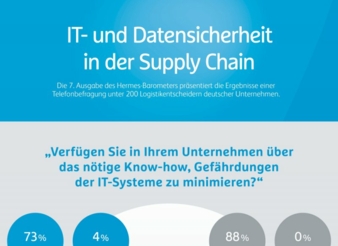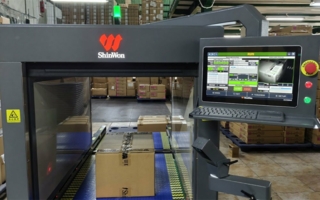15/02/2018 – Hermes Germany — auf Deutsch lesen
IT security and data security in the supply chain
IT security and data security in the supply chain: almost three-quarters of all logistics decision-makers feel well-positioned
The logistics sector is considered to be a trailblazer for everything related to digitisation and networking. However, the sector is well-armed to deal with possible risks: almost three-quarters of German logistics decision-makers are of the opinion that they have the necessary know-how within their companies to limit risks to IT systems to an acceptable level. In large companies with over 250 employees, as high as almost 90 percent agree with this statement. These are the results of the current “IT security and data security in the supply chain” Hermes barometer from Hermes Germany, a survey of 200 logistics decision-makers in German companies.
The logistics sector is considered to be a trailblazer for everything related to digitisation and networking. Many companies are aware of possible risks: 41 percent of logistics decision-makers consider hacker attacks, computer viruses and similar IT security incidents to be the greatest threat to their own supply chain. Every eighth person surveyed is of the opinion that businesses will have to invest significantly more in the future to ensure data security within the supply chain. “With the further networking of logistics processes and the expansion of cross-company information architecture, the requirements in terms of IT security will continue to increase in the future”, comments Jan Bierewirtz, head of Business Development Supply Chain Solutions at Hermes Germany, in relation to the results.
Data protection measures have high priority
Almost one-fifth of companies surveyed (19 percent) have in the past experienced disruption or interruptions to the supply chain due to cyber-attacks. To protect themselves from such attacks, the companies are employing various approaches to protect the data: for 71 percent of those surveyed, the safeguarding of the company network against data leaks has high priority, followed by the encryption of network connections and e-mails (55 percent), as well as the implementation of emergency plans (39 percent). The further training of management and employees as well as background checks before sensitive positions are filled are attributed high importance by only 25 percent and 19 percent of logistics decision-makers respectively.
Areas of the company that are particularly at risk
The vast majority of participants categorise IT-supported warehousing, production and online retailing as the areas of the company that are under less threat. A good half of all those surveyed consider customer and employee data as well as automatic data exchange between suppliers and partners, on the other hand, to be at risk. Not least on account of this, demand for security solutions is rising: “Many companies are in a digital transformation. The exchange of sensitive data with trading partners was expanded in the recent past. Custom IT concepts are required to guarantee secure data transfer”, explains Bierewirtz in relation to the results.
Logistics experts such as Hermes Germany support companies in identifying and exploiting potential for optimisation along the supply chain. Existing structures are examined with the aid of the SCAN analysis tool and, finally, recommended actions and specific measures to increase transparency within the supply chain are given.
The complete Hermes barometer and further information on the topic of Logistics 4.0 and Supply Chain Management are to be found HERE
About the survey
Participants: 201 logistics decision-makers
Method: Telephone survey
Survey period: September 2017




